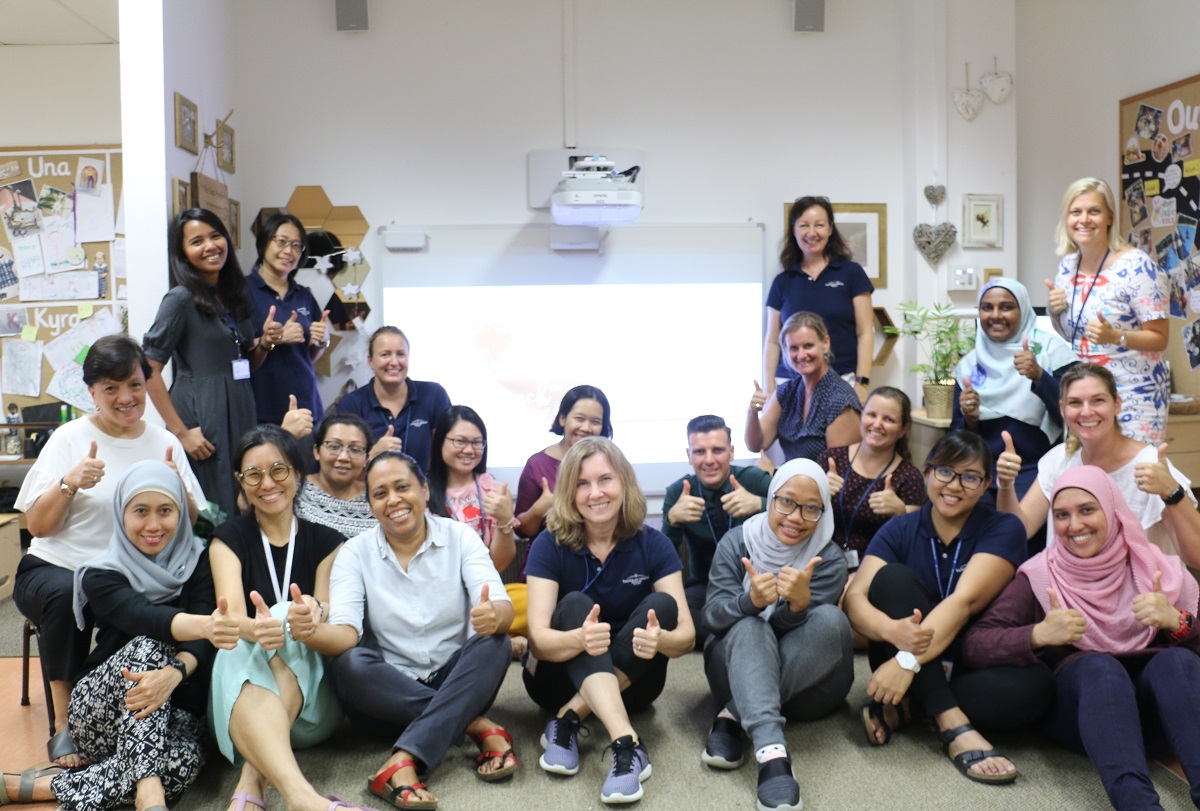BRANDED CONTENT
'We look out for one another': This international school puts staff welfare as first priority
Employees appreciate how Tanglin Trust School goes the extra mile to support them

Staff members stay 8.6 years on average at Tanglin Trust School. The school is ranked one of Singapore's best employers in 2022 according to a list compiled by The Straits Times and global research firm Statista. It is the eighth best company overall and the top firm in the education category. PHOTO (TAKEN BEFORE COVID-19): TANGLIN TRUST SCHOOL
When British national Claire Russell, 48, first moved to Singapore from Brunei to take up the post of assistant head teacher at Tanglin Trust School in 2018, her husband gave up his job to come along.
On arrival, Mr James Russell, 46, himself a teacher who has worked at schools in England, Chile and Brunei, was struck by the warm welcome they received compared to other relocation experiences he had.
“When I first arrived in Chile from England, I was taken to a small apartment that I’d had to locate myself. I was taken to a supermarket, but I didn’t speak a word of Spanish,” he says. “Whereas here, Tanglin helped us so much when we landed with stuff we needed: an iron, ironing board, crockery in the kitchen, things like that. I felt so valued. I felt like I had someone to turn to.”

As children of staff are given priority, their children, Archie, 12 and Nola, eight, were also enrolled at Tanglin. Mr Russell was introduced to the school’s support network for parents, and attended workshops on how he could support his children’s learning.
Shortly after, he found a teaching position at another international school in Singapore. But the warm, people-first culture at Tanglin stayed in his mind, and when a vacancy for a drama specialist tutor position opened up, he leapt at the opportunity.
“I’m a teacher as well as a parent. What Tanglin offers for families is exceptional. It’s important to have family time, and there is a work-life balance that I didn’t get at other schools. I don’t feel like I’m just here to work and produce students who get good grades,” says Mr Russell, who is also head of Wessex House within Tanglin’s house system.
When travel restrictions eased amid Covid-19 and the Russells were able to fly home to visit, the school “bent over backwards” to support them and other foreign staff by adjusting gazetted school holidays and buffering for delayed returns to Singapore, he adds.
Tanglin Trust School has 300 foreign staff – a little over half of all employees, and staff stay for 8.6 years on average.
Says Tanglin chief executive officer Craig Considine: “We always have the best interests of our staff at the forefront of our minds. Staff will perform at their best when they feel valued and supported, and we try hard to ensure that this is always the case.”
Thanks to this, the school is ranked one of Singapore's best employers in 2022, according to a list compiled by The Straits Times and global research firm Statista.
It is ranked eighth overall and it topped the education category.
The not-for-profit international school is the oldest in South-east Asia to offer a British-based education for its 2,800 students aged three to 18.
All three schools under the Tanglin umbrella – infant, junior and senior – have regularly been named “outstanding”, the highest possible grade under the UK Ofsted British Schools Overseas standards.
A family-like environment
The school prides itself on fostering a sense of belonging, through initiatives such as its mentorship programme.
When alumni manager Shakila Samuel, a Singaporean in her 50s, joined the school in 2018, she was assigned a mentor – not only to provide mental and emotional support, but also to introduce her to the culture, people and environment of the school, beyond her immediate teammates.
It is this “Team Tanglin” spirit that sees staff look out for one another. During Covid-19, staff took the initiative to send care packs to quarantined colleagues, setting up a spreadsheet with names, isolation dates, addresses and requests for assistance. They then volunteered to contribute food, books and board games to fill up these care packs, and deliver them to the quarantine locations.

“People from across the school came together. Even if you didn’t know that person, you just put your name down to help,” Ms Samuel says. “I remember packing 10 or 12 care packs and sending them down to hotels for staff under quarantine.”
“That was really so Tanglin,” she adds. “It’s typical of us, we look out for one another.”
Giving staff room to grow
As part of its efforts to prioritise staff welfare, teachers at Tanglin benefit from continuous training – ranging from in-house to certified external courses – that keeps their skills primed to meet ever-changing educational needs.
Mr Russell, for example, attended an Assessment Essentials course by British-based research organisation Evidence Based Education, which encouraged him to rethink how students are being assessed in school and the reasons behind specific assessment formats.
One change he implemented after discussions with his colleagues is moving away from marked assignments and switching to a digital “red, amber, green” evaluation for students aged 11 to 14.
This change better identifies students’ knowledge or skill gaps, and allows Mr Russell to offer more specific feedback.
“It’s refreshing that this school is able to reflect on how you can get the best out of students, making sure that we’re nurturing them,” he says.
Adds CEO Considine: "We believe that all members of staff have a right to high quality professional development opportunities, and pride ourselves on being a community of lifelong learners."



